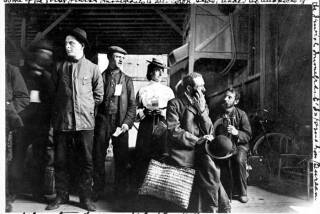A Bouncy Yeltsin Right at Home in Manhattan : Diplomacy: Russian leader dines with Wall Street bankers, tours the garment district, lectures at NYU.
NEW YORK — With his customary and seemingly tireless gusto, Boris N. Yeltsin took a Siberian-sized bite into the Big Apple on Friday, dining on Wall Street with bankers and businessmen, pressing the flesh in the garment district and confessing to students at New York University that he had been something of a “hooligan” in his youth.
Wrapping up what his aides obviously considered a highly successful four-day visit to the United States, Yeltsin spent a fast-paced day in New York, lecturing academics at NYU, promoting Russian trade and investment opportunities with Wall Street bankers and, a bit clumsily, trying his beefy hand at sewing a seam in a dress factory in Manhattan’s garment district.
And it was there, in the garment district, that the former Communist and newly elected president of the Russian Federation, the largest republic in the Soviet Union, discovered yet another shocking fact about capitalism:
Chatting happily in Russian with Jadwiga Grabawska, a Polish immigrant, Yeltsin asked her how much she makes as a seamstress. When she answered, Yeltsin exclaimed: “That’s three times more than I earn!”
Yeltsin came to New York after three days of talks in Washington, where he was received at the White House, honored on Capitol Hill, mobbed by well-wishers at the Lincoln Memorial and showered with gifts ranging from a 10-gallon cowboy hat to a novel in which he is a character who gets assassinated by the KGB.
Indeed, so fussed over was Yeltsin--particularly by the Republican right, which could not seem to get enough of his denunciations of communism--that anyone might think he was just as big a Soviet star as Mikhail S. Gorbachev. Which, of course, was precisely the recognition that Moscow’s latest man of the hour came here to achieve.
Although his visit resulted in no specific pledges of U.S. support for the Russian economy, Yeltsin said upon his arrival in New York that he was pleased with the outcome of his 90-minute meeting with President Bush on Thursday. “What is important (is) President Bush announced for the first time that he is prepared to conduct business and foreign relations on two tiers--with the central government and with the republics and, of course, with Russia first,” Yeltsin said.
Administration officials, eager not to undermine Gorbachev’s position, suggested that Yeltsin had overstated the outcome of the talks with Bush and senior Cabinet members. They said that any possible U.S. initiatives--which could include training programs for Russian managers and advice in converting military industries to civilian use--would be undertaken only with Gorbachev’s consent and would, in any case, pale in comparison to the assistance the West is thinking of extending to the central Soviet government.
National Security Adviser Brent Scowcroft also made it clear that, while the White House wants to encourage Yeltsin’s reform efforts, it does not regard the Russian president as an alternative to Gorbachev and will work with him only as long as he continues to cooperate with the Soviet leader.
Throughout his visit, Yeltsin himself has exhibited ambivalence on that point--criticizing Gorbachev’s “hesitation” and “inconsistency” even as he assured U.S. officials that his reconciliation with the Soviet leader is sincere.
In his speech to about 500 professors and students at NYU on Friday, Yeltsin never once mentioned the Soviet leader by name. But noting recent reports from Moscow that Soviet hard-liners were mounting a new attempt to curb Gorbachev’s powers, Yeltsin did single out three conservatives, Prime Minister Valentin S. Pavlov, KGB chief Vladimir A. Kryuchkov and Defense Minister Dmitri T. Yazov, for harsh criticism.
“Whatever Pavlov, Kryuchkov and Yazov say, Russia has made its choice,” Yeltsin declared, referring to his election earlier this month as the first democratically chosen leader in the federation’s history. “It was not the leaders who chose the road, it was the people, and there will be no turning back from the path of democracy.”
The notion that Russia is on the irreversible road to democracy no matter what happens to the rest of the Soviet Union is the major theme that Yeltsin has been expounding from the start of his visit, which Russian officials have conceded is an attempt to burnish the Russian president’s image as a world-class leader on a par with Gorbachev.
The last time he visited the United States two years ago, Yeltsin was largely snubbed by the Bush Administration, and reports of his heavy drinking caused a minor scandal upon his return to Moscow. On this visit, the only liquids that have flown freely were tea and coffee, and Yeltsin was confident enough of the statesman-like stature he has since assumed to joke about his past behavior at NYU.
He had been a “hooligan,” in his youth, Yeltsin confided, quickly adding assurances that he has matured and is now quite responsible.
If there were still any doubt of that, as Yeltsin wound up his triumphant visit and prepared to return to Moscow, it was dispelled outside NYU’s Vanderbilt Hall. There, a small group of New Yorkers gave Yeltsin the ultimate proof that he had arrived at a position of international prominence: They picketed him.
About 20 old guard, unrepentant socialists, of the sort that can still be found in Greenwich Village and the upper reaches of the West Side, protested Yeltsin’s conversion to capitalism, chanting: “Yeltsin fool, Wall Street tool.” Yeltsin, who had entered the building through a side door, did not see them.
More to Read
Sign up for Essential California
The most important California stories and recommendations in your inbox every morning.
You may occasionally receive promotional content from the Los Angeles Times.










